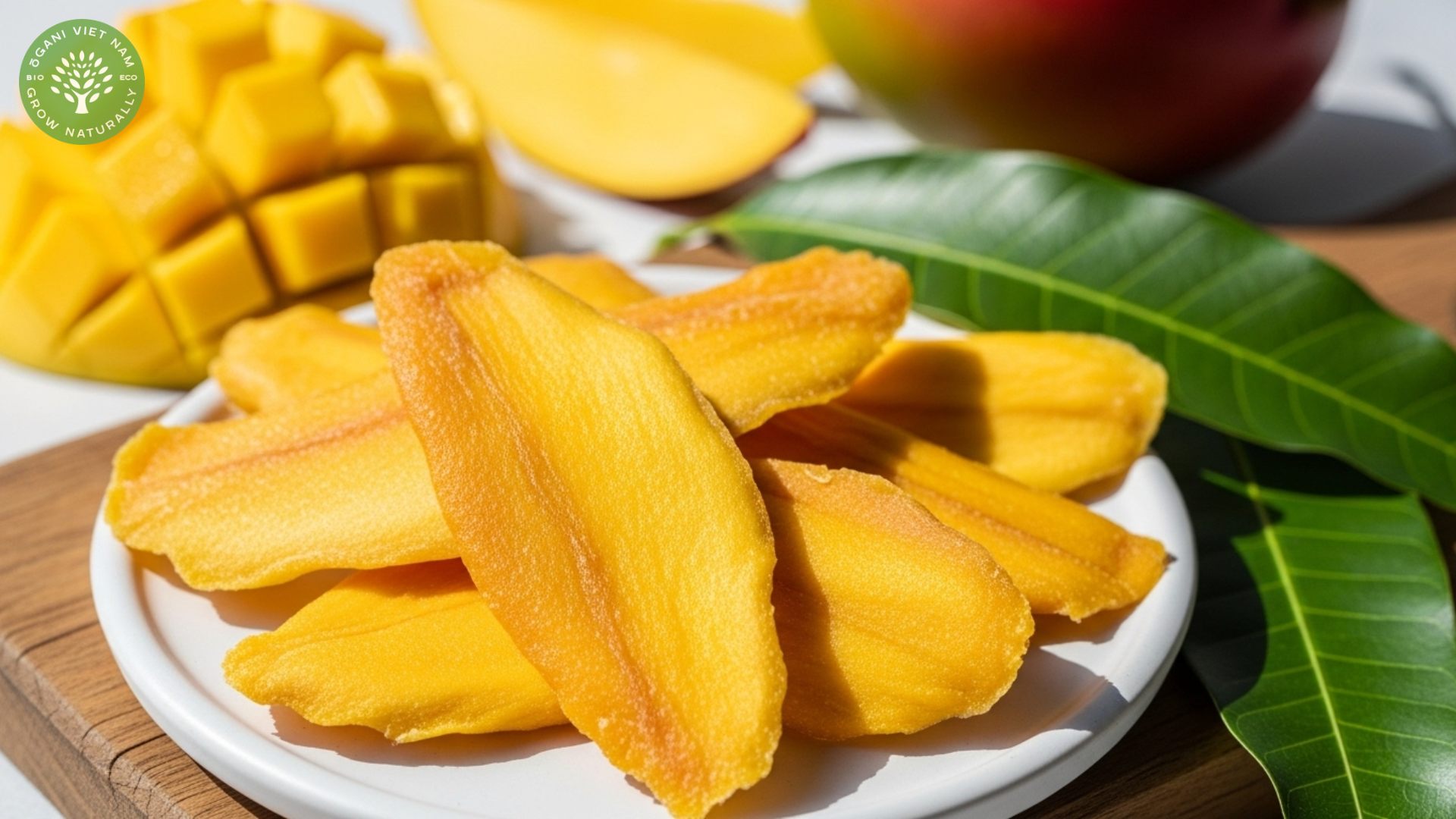Dried mangoes are good for supporting your immune system, improving digestion, and providing a quick source of natural energy—all while delivering essential vitamins and antioxidants in a convenient, portable form. At Ogani VN, we’ve seen how this tropical superfood has become a go-to snack for health-conscious individuals looking for something both nutritious and delicious.
What are dried mangoes good for: Essential vitamins and minerals
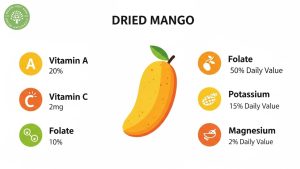
When you bite into dried mango, you’re getting a concentrated dose of nutrients that fresh mango provides, just in a more shelf-stable package. The dehydration process removes water but keeps most of the good stuff intact.
Vitamin A stands out as one of dried mango’s most impressive features. Just a small serving can deliver a significant portion of your daily requirement, which your body uses to maintain healthy vision, support skin cell renewal, and keep your immune defenses strong. Think of it as your daily insurance policy against seasonal bugs and dull-looking skin.
The vitamin C content deserves its own spotlight too. While some of it does break down during the drying process, dried mangoes still pack enough of this antioxidant to help your body fight free radicals—those pesky molecules that contribute to aging and cellular damage. We’ve noticed customers who regularly snack on our dried mango often mention how their skin looks more vibrant, though of course, individual results vary.
Folate, another key player in dried mango’s nutritional lineup, supports cell division and DNA synthesis. This makes it particularly valuable for pregnant women or anyone focused on cellular health. The naturally occurring minerals like potassium and magnesium also contribute to heart health and muscle function.
What are dried mangoes good for: Digestive health and fiber benefits
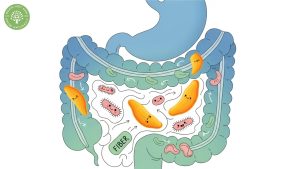
Here’s where dried mango really shines—and where many of our customers at Ogani VN first notice the difference. The dietary fiber content in dried mango acts like a gentle broom for your digestive tract, promoting regular bowel movements and supporting overall gut health.
One serving of dried mango contains several grams of fiber, which helps you feel fuller longer. This satiety effect means you’re less likely to reach for that second (or third) snack an hour later. The fiber also slows down sugar absorption, preventing those dramatic blood sugar spikes that leave you crashing on the couch.
For anyone dealing with occasional constipation, dried mangoes can be a natural, tasty solution. The fiber adds bulk to stool and stimulates intestinal movement—though we always recommend starting with smaller portions if your body isn’t used to high-fiber foods. Nobody wants digestive drama, right?
The prebiotic properties of this fiber also feed the beneficial bacteria in your gut. These microscopic helpers influence everything from your mood to your immune response, so keeping them well-fed matters more than most people realize.
What are dried mangoes good for: Natural energy and athletic performance

Mid-afternoon slump? We get it. That’s when dried mango becomes your best friend. The natural sugars—primarily fructose and glucose—provide quick energy that your body can actually use, unlike the empty calories from processed snacks.
What makes dried mangoes different from candy or energy drinks is the accompanying nutrients. You’re not just getting sugar; you’re getting vitamins, minerals, and fiber that slow down absorption and provide sustained energy. It’s the difference between lighting a firecracker and building a campfire—one burns out fast, the other keeps you warm for hours.
Athletes and active individuals often keep dried mango in their gym bags for exactly this reason. The carbohydrates replenish glycogen stores after workouts, while the potassium helps prevent muscle cramps. We’ve heard from marathon runners who swear by it during long training sessions.
For students or professionals facing mentally demanding tasks, the glucose supports brain function. Your brain runs on sugar, after all—might as well feed it something that also delivers vitamin A and antioxidants.
What are dried mangoes good for: Antioxidant protection and immune support

The antioxidant profile of dried mango reads like a who’s-who of cellular defenders. Beta-carotene, which your body converts to vitamin A, teams up with vitamin C and vitamin E to neutralize oxidative stress throughout your body.
These antioxidants work at the molecular level, donating electrons to unstable free radicals and preventing them from damaging your cells. Over time, this protection may support everything from cardiovascular health to reduced inflammation. The polyphenols in mango—including mangiferin, a compound researchers find particularly interesting—add another layer of antioxidant activity.
What does this mean for you practically? Well, chronic inflammation underlies many modern health concerns, from joint discomfort to accelerated aging. While dried mangoes won’t cure diseases, incorporating them into a balanced diet adds to your body’s natural defense system.
Your immune system doesn’t take vacations, so it needs consistent nutritional support. The vitamin A in dried mango plays a crucial role in maintaining the integrity of your mucous membranes—those barrier tissues in your respiratory and digestive tracts that serve as your first line of defense against pathogens. Vitamin C contributes to multiple immune functions, from supporting white blood cell production to enhancing your body’s ability to respond to threats.
The zinc and selenium present in smaller amounts also contribute to immune health, working behind the scenes to regulate immune responses and support antibody production. During cold and flu season, having dried mangoes as part of your daily routine provides a delicious way to supplement your immune-supporting nutrients.
Smart consumption tips and considerations
Let’s be real for a second—when people ask what are dried mangoes good for, they also need to know the smart way to enjoy them. Dried mango isn’t perfect for everyone in every situation. The calorie density means a little goes a long way. What would be a whole mango becomes a small handful of dried pieces, so it’s easier to overconsume calories if you’re not paying attention.
The natural sugar content, while preferable to added sugars, still affects your blood glucose. People managing diabetes should consult their healthcare providers about appropriate portion sizes. Generally, pairing dried mango with protein or healthy fats (like nuts) helps moderate the glycemic response.
Some commercially dried mangoes contain added sugar or preservatives, which defeats part of the purpose. At Ogani VN, we prioritize products with minimal processing—ideally just mango and nothing else. Always check the ingredient list before purchasing.
Sulfites, sometimes used to preserve color, can trigger reactions in sensitive individuals. If you notice any adverse effects after eating dried mango, sulfite sensitivity might be the culprit. Look for sulfite-free options or try different brands.
Portion control matters—and this directly impacts what are dried mangoes good for in your personal health journey. A reasonable serving is typically 1/4 cup or about 40 grams. This gives you the benefits without overdoing the calories or sugar. Think of it as a supplement to your diet, not a replacement for fresh fruits and vegetables.
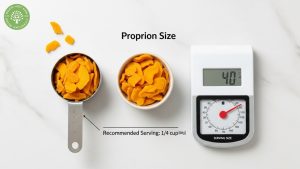
Frequently Asked Questions
Is dried mango as healthy as fresh mango?
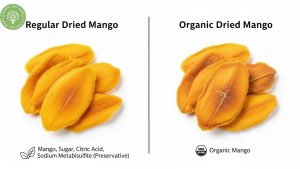
Dried mango retains most vitamins and minerals but has concentrated sugars and calories. Fresh mango provides more vitamin C and hydration, while dried mango offers convenience and longer shelf life. Both have their place in a healthy diet.
Can I eat dried mango every day?
Yes, in moderation. A small daily portion (around 1/4 cup) can be part of a balanced diet. Monitor your overall sugar and calorie intake, and vary your fruit sources for diverse nutrients.
Does dried mango help with weight loss?
The fiber content may support weight management by promoting satiety, but dried mango is calorie-dense. It works best as a controlled snack replacement for less nutritious options, not as a weight loss miracle food.
Are there any side effects of eating too much dried mango?
Overconsumption can lead to digestive discomfort (bloating, gas, or diarrhea) due to high fiber and sugar content. Some people may experience blood sugar spikes. Stick to recommended portion sizes.
Should I choose organic dried mango?
Organic options reduce pesticide exposure and often avoid sulfites and added sugars. While not strictly necessary for everyone, organic dried mango aligns with clean eating principles and may offer peace of mind.
Making dried mango part of your healthy lifestyle
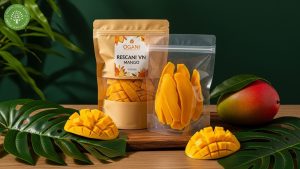
What are dried mangoes good for? They’re good for convenient nutrition, supporting your immune system, boosting energy naturally, and satisfying sweet cravings without resorting to processed junk. The fiber supports digestive health, the antioxidants protect your cells, and the vitamins contribute to overall wellness.
At Ogani VN, we believe in making healthy eating accessible and enjoyable. Dried mango embodies that philosophy—it’s nutritious enough to feel good about, tasty enough to actually enjoy, and convenient enough to fit into busy lifestyles. Whether you’re packing lunches, prepping snacks for a road trip, or just want something wholesome to munch on during your afternoon Netflix session, dried mango delivers.
Ready to experience the benefits for yourself? Explore our selection of premium dried mangoes and discover why this tropical treat has earned its superfood status. Your taste buds and your body will thank you.
Read more:
- Dried Mango Is It Good For You: Complete Health Guide 2025
- Best Dried Mango No Sugar Added: Premium Quality Guide
- Calories In Dried Mango No Sugar Added: Complete Nutrition Guide
- Are Dried Mangoes Good For You? The Complete Health Guide
- What Are Dried Mangoes Good For? Health Benefits You Need to Know


